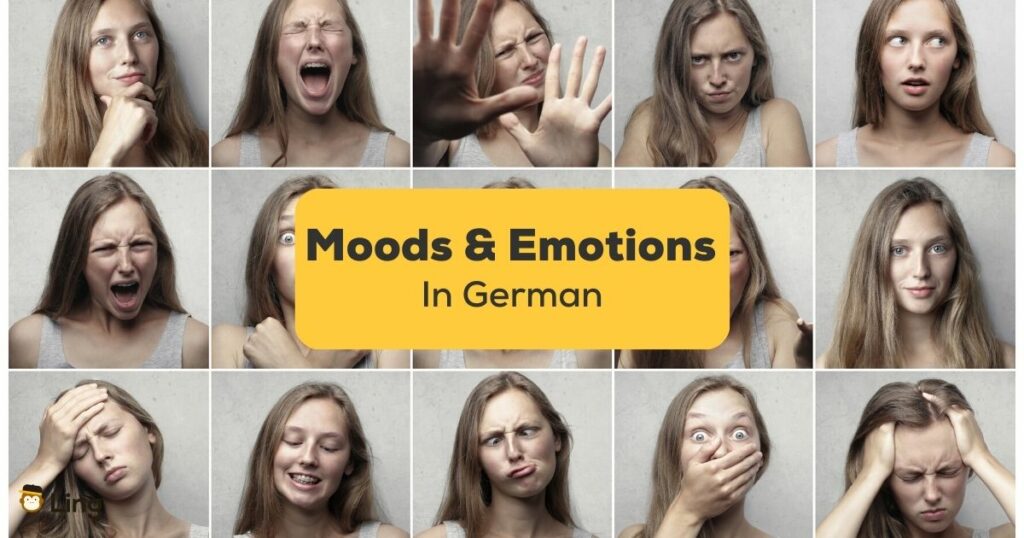Learning a new language is not only about grammar and vocabulary but also about understanding the culture and emotions of the people who speak it. That’s why in this comprehensive guide, we’ll explore more than 30 easy words for moods and emotions in German. By learning some of these, you’ll be able to express yourself better and have deeper conversations with native speakers. So let’s dive in!
We’ve all experienced those days when we practically spring out of bed, overflowing with energy and enthusiasm, ready to conquer the world! But, let’s be real, there are also those days when all we want to do is blast My Chemical Romance, Fall Out Boy, and Paramore songs on repeat, sinking deep into our emo feels. If you’ll ask me, embracing the rollercoaster of emotions is what makes us human, and having the ability to describe and recognize our Laune or mood can seriously make a difference not just for ourselves but also for the people around us.
Imagine the impact of being able to share your emotions with just a few simple expressions like “Ich fühle mich elend” (I feel awful) or “Ich fühle mich toll” (I feel great). By doing so, you’re giving others a heads-up on how to approach you and respond to your vibes. I know this pretty well because I’ve been there before! You see, I’ll never forget my time in Germany when I’d say “Ich fühle mich gut” (I feel good) on repeat. Even though my wheezing voice (hello to all the asthmatic travelers out there😂) might have hinted otherwise, it reassured native speakers around me that I was totally on board with all the exhilarating tours we embarked on.
Ready to learn how to express your feelings in German? Let’s go over all the juicy info in the sections below.

Moods And Emotions In German
Before we dive into the exact words and sentence structures to express yourself, let’s briefly review the meaning of these words: die Laune and das Gefühl.
Die Laune refers to your mood, which can be as fleeting as the weather or as steady as your favorite playlist. It’s that intangible vibe that influences your outlook on life and how you interact with others. One moment you’re riding high on cloud nine, and the next, you’re channeling your inner emo. Here are some examples of mood-related German words:
Last but not least, we have das Gefühl, which translates to “feeling” in English. This can refer to both physical sensations and emotional states, encapsulating the full range of human experiences. From the butterflies in your stomach to the warmth of a hug, feelings are the building blocks of our emotional world.
Now that we’ve got the basics down, let’s jump into the nitty-gritty of expressing moods, emotions, and feelings in German. Trust us, you’ll be a pro in no time!
Basic Moods And Emotions In German
Embarking on your journey to express yourself emotionally in German? Start by mastering the essential building blocks: basic emotions. In this section, we’ll cover the most common feelings that transcend cultural boundaries, making it easier to connect with native speakers on a deeper level.

Happiness And Joy
A smile is universal, and so are expressions of happiness and joy. These terms will help you share your positive vibes and spread some cheer in German, whether you’re celebrating a special occasion or simply enjoying life’s little pleasures.

Sadness And Sorrow
We all have our gloomy days, and it’s important to acknowledge and express those feelings too. Here are some German terms to help you convey your sadness or sorrow, allowing you to seek comfort and understanding from others.
| English | German | Sound |
|---|---|---|
| sad | traurig | |
| depressed | deprimiert | |
| lonely | einsam | |
| disappointed | enttäuscht | |
| hopeless | hoffnungslos | |
| frustrated | frustriert | |
| angry | wütend | |
| scared | verängstigt | |
| miserable | elend | |
| guilty | schuldig |

Anger And Frustration
Feeling a little fired up? These German expressions will help you articulate your anger and frustration, allowing you to vent and move past those pesky negative emotions that occasionally cloud our judgment.
| English | German | Sound |
|---|---|---|
| angry | böse | |
| annoyed | genervt | |
| furious | rasend | |
| irritated | irritiert | |
| mad | wahnsinnig | |
| outraged | empört | |
| resentful | nachtragend | |
| spiteful | gehässig | |
| vexed | verärgert | |
| wrathful | zornig |

Fear And Anxiety
No one is immune to fear and anxiety, but having the right words to express these feelings can make all the difference. Equip yourself with these German terms to communicate your concerns and worries with others.
| English | German | Sound |
|---|---|---|
| afraid | ängstlich | |
| anxious | besorgt | |
| fearful | furchtsam | |
| nervous | nervös | |
| scared | verängstigt | |
| terrified | entsetzt | |
| worried | beunruhigt | |
| alarmed | alarmiert | |
| horrified | entsetzt | |
| panicked | panisch |

Surprise And Amazement
Life is full of unexpected moments, and sometimes, our reactions to these events leave us in awe. These German expressions will help you capture the essence of surprise and amazement, whether you’re witnessing a stunning sunset or receiving an unexpected gift.

Love And Affection
When it comes to matters of the heart, the German language has a range of terms to express love and affection. Share your warm feelings and tender moments using these lovely words!
| English | German | Sound |
|---|---|---|
| passionate | leidenschaftlich | |
| emotional | emotional | |
| respectful | respektvoll | |
| enamored | verliebt | |
| obsessed | besessen | |
| sentimental | sentimental |

Jealousy And Envy
Green with envy? Sometimes we can’t help but feel a twinge of jealousy or envy towards others. Use the German words from the table below to give voice to those emotions!
| English | German | Sound |
|---|---|---|
| jealous | eifersüchtig | |
| envious | neidisch | |
| suspicious | misstrauisch | |
| disgust | der Ekel | |
| hostile | feindselig | |
| resentful | verärgert |

Shame And Embarrassment
Oops! We all experience moments of shame and embarrassment, but it’s how we handle them that defines us. Use these German words to convey your feelings of discomfort and move forward with grace.
| English | German | Sound |
|---|---|---|
| ashamed | beschämt | |
| embarrassed | verlegen | |
| discouraged | entmutigt | |
| worthless | wertlos | |
| guilt | schuldig | |
| remorseful | reumütig | |
| regretful | bedauernd | |
| awkward | unbeholfen |
Sentence Structures For Mood And Emotions In German
Now that you know the exact words to use to describe your moods and emotions in German, let’s expand your knowledge further but using them in complete sentences. In this section, we’ll go over three of the basic ones and give you examples of their usage.
Ich bin + Mood/Emotions In German
One of the most common ways to express your mood or emotions in German is to use the phrase “Ich bin,” which means “I am.” You can simply add an adjective after it to describe how you feel.
- I am confused = Ich bin verwirrt.
- I am tired = Ich bin müde.
- I am optimistic = Ich bin optimistisch.
- I am relieved = Ich bin erleichtert.
- I am very sad = Ich bin sehr traurig.
Notice how we use the word “sehr” in the last example? This German adverb is perfect for when you want to express “very.”
Mir ist + Mood/Emotions In German
Another way to express your mood or emotions in German is to use the phrase “Mir ist,” which means “I feel.” This phrase is usually followed by a noun that describes your emotional state.
- I feel very cold = Mir ist sehr kalt.
- I feel a little bit bored = Mir ist ein bisschen langweilig.
- I feel bored = Mir ist langweilig.
- I feel sick = Mir ist übel.
- I feel embarrassed = Mir ist peinlich.
Aside from using “sehr,” you can also use other words like “ein bisschen” (a little bit) and “nicht” (not) to modify the intensity of your emotion.
Ich fühle mich + Mood/Emotions In German
A third way to express your mood or emotions in German is to use the phrase “Ich fühle mich,” which means “I feel.” This phrase is usually followed by an adjective that describes your emotional state.
- I feel lonely = Ich fühle mich einsam.
- I feel great = Ich fühle mich toll.
- I feel comfortable = Ich fühle mich wohl.
- I feel awful = Ich fühle mich elend.
- I feel angry = Ich fühle mich wütend.
Ready To Learn German?
And there we have our complete guide on the words related to moods and emotions in German! As you reach this part of the article, we hope that you learned something new and that you find the confidence to try and use these in your next conversations. After all, the only way to truly master a language point is when you apply it in real-life contexts. Now if you need a little boost to further enhance your skills in this language, then you’ve got to try Ling!
Ling-App is a language-learning app built to help you grasp the intricacies of German and 60+ other languages. From basic terms to grammatical points, we’ve got you covered! But her! Don’t just take our word for it. Download it from the App Store or Play Store for FREE to see how it goes!



































































